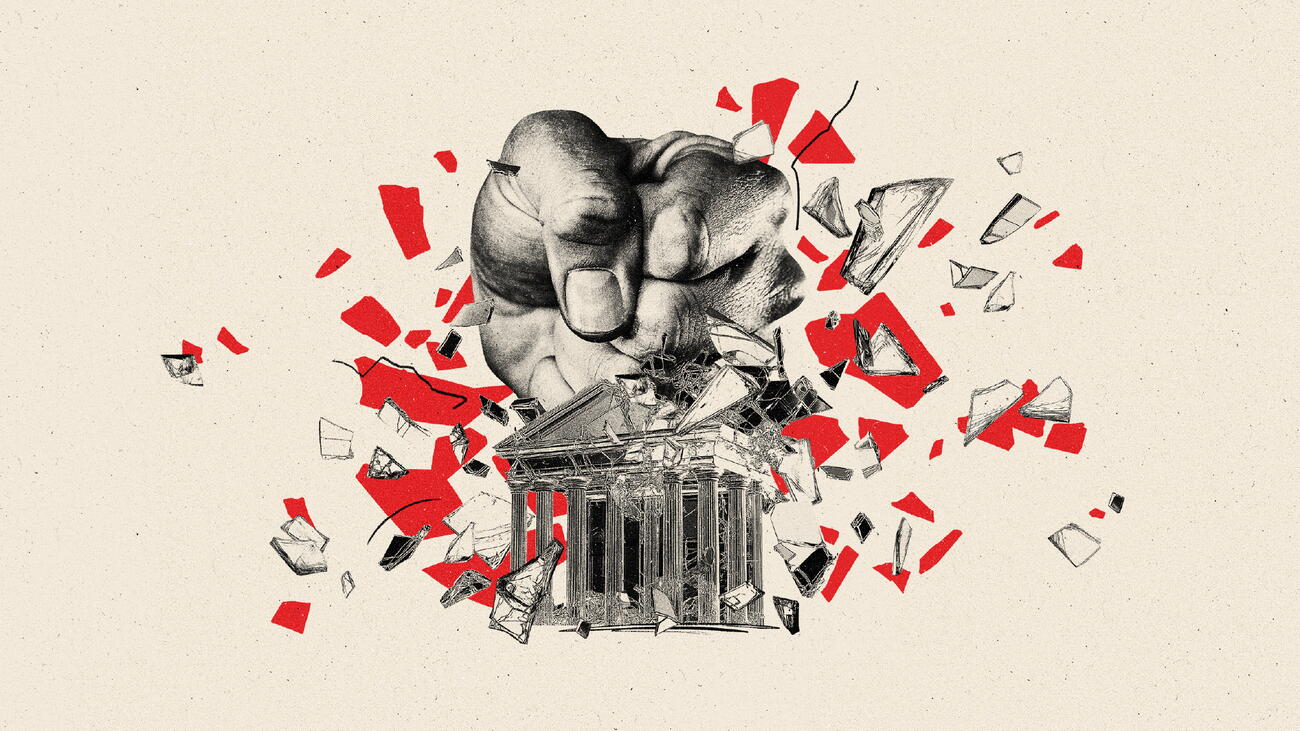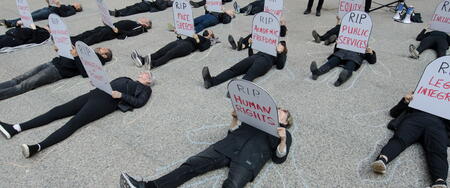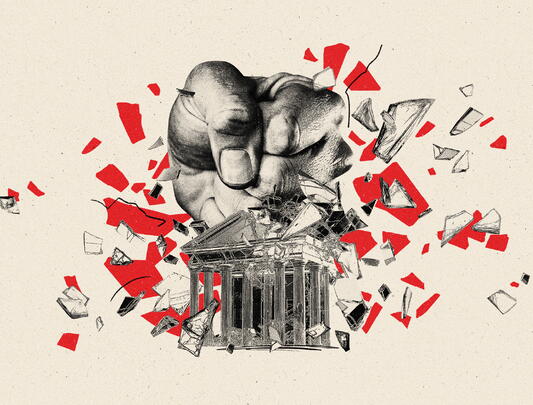
Illustration by Klawe Rzeczy
The “strongmen” who are breaking democracies
Autocratic leaders are more likely to score highly on dark personality traits and perform poorly. Why do people vote them into office?
One might think the rise of modern democracy would have pushed “strongman” leaders – autocratic bullies like Emperor Nero, Genghis Khan, and Adolf Hitler – to the fringes of global politics.
But leaders with autocratic tendencies have become more prevalent over the past decade, and many are being voted in by democracies – including Hungary, Turkey, Slovakia, and (perhaps most alarmingly) the US.
Their style of governance attacks the very foundations of democracy: They undermine or flout the rule of law, bully and threaten critics and media, and tamper with free elections. So why are people, even in long-established democracies, electing such undemocratic leaders?
Part of the answer could have its roots in our deepest – and darkest – psychology.
Many strongman leaders aren’t just undemocratic, they exhibit “dark personalities,” a term psychologists use to describe psychopathy, narcissism, sadism, and/or Machiavellian manipulativeness – the “Dark Tetrad” of personality traits.
“These personality traits exist not just in the extreme criminal context, but really permeate our everyday lives,” says Leanne ten Brinke (PhD’12), associate professor of psychology at UBC’s Okanagan campus.
Dr. ten Brinke began her career studying the behaviour of convicted criminals, but during a post-doc at the University of California Berkeley’s Haas School of Business, she became interested in the dark personalities that walk among us, from tyrannical dictators, to cutthroat CEOs, to cheating spouses.
As director of UBC’s Truth and Trust Lab, ten Brinke and her colleagues explore the minds of these dark personalities – and also why people are so ready to trust them, even revere them.
Dark Tetrad traits usually appear together – people who score highly on one often have high scores on all four – and they are more common than you might think: Roughly 20 per cent of us have noticeably dark traits, and while only around one in a hundred people is a psychopath by clinical standards, at some point most of us will encounter someone – a co-worker, perhaps a date – with elevated levels of these personality characteristics.
Dark personalities are also more likely to strive for high positions, and often obtain them through lies, manipulation, and intimidation.
“The dark traits tend to be associated with interest in power,” ten Brinke explains. “They tend to perceive interactions as very dog-eat-dog competitive. They generally don’t see a world in which there’s win-win, because they’re quite interested in dominating other people.”
It comes as no surprise, then, that the hallmarks of dark personalities tend to be the same hallmarks of strongman leaders.
Take the current American president. Nobody can diagnose Donald Trump with a personality disorder from media coverage, but we can observe his behaviour: He appears to act impulsively, which is one of the clinical symptoms of psychopathy. He also lies freely and apparently without remorse (“manipulativeness”). He’s ready to mock and insult anyone and everyone (“callousness”). He tosses aside rules and etiquette (“persistent antisocial behaviour”). And while he may never conquer Canada, he probably thinks he can (“grandiose sense of self-worth”).
Some people interpret this behaviour as a welcome upending of the status quo, or as well-calculated misdirection meant to wrong-foot his opponents. But others see it as something darker.
“I hesitate to make a definitive statement, but if you think about what makes up psychopathy, his behaviour would suggest that he’s high in many of these traits,” says ten Brinke.
Regardless of whether prominent strongman leaders like Trump, Hungary’s Viktor Orbán, or Vladimir Putin have true dark personalities or are merely employing similar tactics, their dominance-based leadership styles tend to be less effective than respect and empathy-based approaches associated with a more democratic leadership style.
One study that ten Brinke co-authored examined hedge fund managers who show psychopathic tendencies – the real-life Patrick Batemans of American Psycho – and found that these people actually make for lousy investors.
“Psychopathic leaders can be charming and persuasive, but poor performers who mismanage, bully, and engage in unethical behaviour,” the study concluded.
Another study analyzed the careers of US senators who exhibited dark traits. These lawmakers, though possessing superficial charm, were often less able to find co-sponsors for bills and influence their peers.
Historically, strongman leaders have been associated with fear and bloodshed – and they tend to be lousy for an economy.
A study published last year in the European Journal of Political Economy found that throughout the world, countries run by dictators tend to have far weaker economies than more democratic ones (although those dictators often falsify their economic data).
So why do people keep getting duped by dark personalities? Why do we fall for narcissistic lovers, award promotions to pathological liars, and elect full-blown psychopaths to government offices?
One answer is that humans are naturally trusting. Most of us try not to tell lies or knowingly stomp on people’s feelings, and we usually expect the same from others.
“We’re sitting ducks,” ten Brinke explains. “There’s actually an evolutionary theory that the proportion of dark personalities who use this kind of manipulative approach to get what they want stays at relatively low levels in the population because they are exploiting that trust that most of us have.”
Furthermore, sometimes people actually want psychopaths to be in charge.
“When people are uncertain and a little scared, if there’s economic uncertainty or military conflict, and we feel like we need a strong person to stand up for us, those kinds of conditions can increase the likelihood that you get support for that person who adopts a dominant approach to leadership, as opposed to a more respect-based approach.”
Where one voter sees impulsivity, ruthlessness, and deceit, others might see decisiveness, strength, and cunning.
Where one voter sees impulsivity, ruthlessness, and deceit, others might see decisiveness, strength, and cunning.
Furthermore, ten Brinke says dark traits are not confined to any particular political party. Republican or Democrat, Liberal or Conservative – anyone can lie, manipulate, and strong-arm their way to the top.
Unfortunately, there isn’t really a “cure” for dark personality traits, especially in adults. Darth Vader and Ebenezer Scrooge may have had changes of heart, but in the real world it is extremely difficult to alter someone’s fundamental nature – especially for dark personalities, who often fail to see their personality as a problem at all.
“ They don’t learn from punishment in the same way that the rest of us do, particularly those high in psychopathic personality traits. It might feel morally righteous for us to punish a person with a dark personality who has done something wrong, but it’s not likely to change their behaviour.”
A more effective approach is to meet them on their own terms.
“What seems to work better is rewarding them for good things they do. That’s the basis of treatment for youth with callous, unemotional traits: really focusing on rewarding them for engaging in pro-social behaviour while also trying to discourage the anti-social stuff.”
As for avoiding strongman leaders in office: vote your party, vote your conscience, but try not to vote for a psychopath.



































